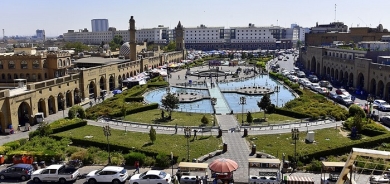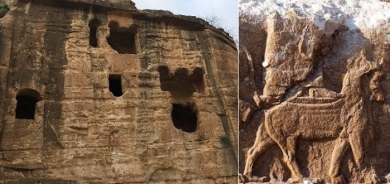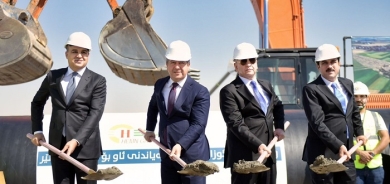President Nechirvan Barzani Commemorates the late Professor Mustafa Zalmi as a Beacon of Reform in Islamic Theology and Jurisprudence

President Nechirvan Barzani participated in the centenary celebrations for the renowned Kurdish and Islamic scholar, Professor Dr. Mustafa Zalmi. The event was organized by the Islamic Thought Forum and the Mustafa Zalmi Cultural Organization in Erbil.
The President was pleased to make an address during the ceremony, which was attended by a large number of influential figures from the world of politics, academics, and religious scholars from both within and outside the Kurdistan Region, as well as representatives from Al-Azhar Al-Sharif, and members of Professor Zalmi’s family.
The following is a readout of his speech:
Dear Attendees,
Good morning,
We extend a warm welcome to all attendees. I would like to offer a particular greeting to the esteemed guests from the Al-Azhar al-Sharif. It is our honor to have you with us during this ceremony, which commemorates the centenary of the birth of an exceptional individual, renowned Kurdish scholar and figure in the Islamic world, Professor Dr. Mustafa Zalmi.
The late Zalmi was not only an academic and an intellectual, but constituted also a beacon of reform and revitalization within Islamic thought and jurisprudence. This individual, dedicated to fostering a more equitable and compassionate society, successfully integrated long-standing religious principles with the demands of contemporary times, thereby accomplishing significant contributions towards a more progressive approach.
Dr. Mustafa Zalmi possessed a thorough vision for reform, grounded in a profound conviction that Islam serves not as a barrier to advancement, but rather as a catalyst for development and rejuvenation. He maintained that Islamic laws are not immutable, but rather tools designed to serve humanity, and as such, they must adapt to the evolution of any society.
Dr. Zalmi offered a fresh and insightful interpretation of the Shari'ah texts. He emphasized the importance of continuous ijtihad (independent reasoning by an expert), warning that a cursory understanding of these texts could impede societal advancement. He asserted that Islam, as a faith rooted in compassion and justice, inherently rejects all forms of oppression and discrimination.
Dear Attendees,
I had previously read both Zalmi’s works and what has been written about him. I was aware then that achieving our objectives would be challenging without his assistance and backing. Therefore, as Professor Mohammad Sharif also mentioned, during my initial meeting with Dr. Zalmi on July 12, 2007, I requested that he remained in Kurdistan.
His involvement was crucial for significant reforms in the Personal Status Law. He played a vital role in combating misunderstandings and popular misconceptions around topics such as female circumcision, divorce, femicide, and polygamy through constructive intellectual discourse and discussions of a legal nature.
In that same year, I oversaw the initiation of the Bill to amend the Personal Status Law, chaired by Dr. Zalmi and supported by a committee of ten prominent experts. Our team dedicated eight months to this endeavor, engaging with all relevant parties to lay the necessary groundwork.
The final preparations were conducted in a manner that aligned with the Holy Quran, subsequently receiving approval from the Kurdistan Council of Ministers and Parliament. The modifications directly resulted in the increase in the legal marriage age, the establishment of stringent regulations regarding polygamy, and advancements towards achieving equality in inheritance rights for men and women alike.
Such achievements would certainly not have been feasible without Zalmi's profound comprehension of the Holy Qur'an and its associated legal principles. He was to this end instrumental in helping religious scholars understand the significance of these modifications and the far reaching effects they would have in creating a more progressive society.
Zalmi founded a significant intellectual movement rooted in the compassionate interpretation of Islam, distancing it from outdated traditions that lack relevance to the faith. As a result, Kurdish society remains perpetually grateful for Zalmi's scholarly and intellectual advancements.
He collaborated diligently with clerics, scholars, lawmakers, and political figures to build firm foundations for the harmonious integration of Islamic principles and modern society. Although his undertaking was challenging, he was behind legislation that struck a careful balance between the preservation of cultural and religious values and the promotion of justice and equality for everyone.
Such legislation served not merely as a legal documents but also as the embodiment of Dr. Zalmi's philosophy, which denounces oppression and upholds the values of humanity and human dignity. He consistently prioritized the importance of human dignity.
Ladies and gentlemen,
Dr. Zalmi held the conviction that the empowerment of women transcends mere rights; it is a fundamental element in the creation of a robust and stable society. He was among those pioneers in the field of women's rights in the Kurdistan Region.
Dr. Zalmi played a pivotal role in the formulation and implementation of legislation aimed at addressing and penalizing all manifestations of violence against women. The domestic violence law, enacted in 2011, was a direct outcome of his intellectual and legal contributions.
He consistently highlighted that violence against women was not merely an individual issue, but rather a significant threat to society as a whole. He maintained that securing justice for women is a crucial step toward establishing a fairer and more equitable society.
Dr. Mustafa Zalmi recognized that meaningful legal reform necessitates profound dialogue and collaboration among everyone concerned. He was of the opinion that Islamic Sharia and contemporary law are not inherently opposed; rather, they can coexist harmoniously to promote justice and equality.
His philosophical framework was grounded in the conviction that religion serves as a wellspring of moral guidance and justice, whereas law should function as an effective instrument for safeguarding human rights and governing interactions among individuals within society.
Dear Audience,
Dr. Mustafa Zalmi's legacy extends beyond his written works and legal contributions; it embodies a message of hope for future generations. He imparted the lesson that ijtihad and persistent effort are essential for attaining success. His life demonstrated that challenges should not be viewed as hindrances, but rather as catalysts for innovation.
Dr. Zalmi encountered significant obstacles throughout his life; however, he exemplified both courage and perseverance. His dedication to research and legal reforms demonstrated his unwavering commitment to the advancement of science and the betterment of society. Consequently, his life serves as an inspiration for all individuals who aspire to create a brighter future.
True science is defined as that which benefits and uplifts humanity. Any form of science that fails to accomplish this goal is considered inadequate.
Dear Attendees,
We in the Kurdistan Region are dedicated to pursuing the course established by Dr. Zalmi. Our efforts will persist in enhancing social justice, safeguarding human rights, and ensuring that Kurdistan remains a sanctuary for tolerance and coexistence.
We shall persist in our earnest efforts to preserve his intellectual and legal legacy within our society. Such a legacy will serve as a guiding principle in our endeavor to foster a civil society that honors diversity and reinforces human values.
Ladies and gentlemen,
Dr. Zalmi's influence extends well beyond the confines of Kurdistan and Iraq. His intellectual perspectives and reforms served not only to benefit his own nation but also to inspire the broader Islamic world and the global community. In recognition of his contributions, he received an award from Sheikh Al-Azhar Al-Sharif in 2013.
He was not merely a scholar, but also a profound embodiment of a vital human message. This message, centered on justice and tolerance, is more essential now than ever before. He demonstrated that knowledge, coupled with persistent effort, can serve as a powerful catalyst for meaningful improvement. Today, we gather not only to honor his memory, legacy, and accomplishments, but also to reaffirm our dedication to advancing his message.
I wish to express my gratitude to the organizers of this meeting. I sincerely appreciate their diligent efforts. Additionally, I extend my thanks to all those who contributed to preserving the legacy of this respected scholar.
I welcome you all again.
May the memory of the esteemed Professor Dr. Mustafa Zalmi endure forever.
Thank you very much. Wishing you all a pleasant day.
Thank you.














